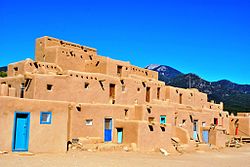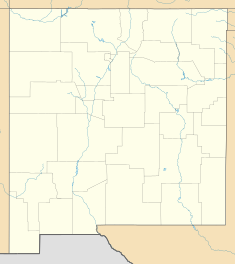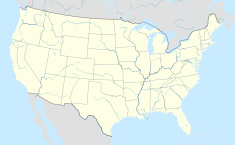Taos Pueblo
| Taos Pueblo Pueblo de Taos |
|
|---|---|
 |
|
| Location | Near Taos, Taos County, New Mexico, U.S. |
| Coordinates | 36°26′21″N 105°32′44″W / 36.43917°N 105.54559°WCoordinates: 36°26′21″N 105°32′44″W / 36.43917°N 105.54559°W |
| Governing body | Native American tribal government |
| Official name: Pueblo de Taos | |
| Type | Cultural |
| Criteria | iv |
| Designated | 1992 (16th session) |
| Reference no. | 492 |
| State Party | USA |
| Region | Europe and North America |
| Designated | October 15, 1966 |
| Reference no. | 66000496 |
| Area | 19 acres (7.7 ha) |
| Architecture | Pueblo |
| Designated | October 9, 1960 |
| Designated | March 13, 1972 |
| Reference no. | 243 |
| Total population | |
|---|---|
| (4,500 (2010 U.S. Census)) | |
| Regions with significant populations | |
| New Mexico; United States | |
| Languages | |
| Tiwa, English, Spanish | |
| Religion | |
| Taos religion (ancient Indian religious rites), Christianity | |
| Related ethnic groups | |
| Other Tanoan peoples |
Taos Pueblo (or Pueblo de Taos) is an ancient pueblo belonging to a Tiwa-speaking Native American tribe of Puebloan people. It lies about 1 mile (1.6 km) north of the modern city of Taos, New Mexico, USA. The pueblos are considered to be one of the oldest continuously inhabited communities in the United States. This has been designated a UNESCO World Heritage Site.
Taos Pueblo is a member of the Eight Northern Pueblos, whose people speak two variants of the Tanoan language. The Taos community is known for being one of the most private, secretive, and conservative pueblos. A reservation of 95,000 acres (38,000 ha) is attached to the pueblo, and about 4,500 people live in this area.
The pueblo was constructed in a setting backed by the Taos Mountains of the Sangre de Cristo Range. The settlement was built on either side of Rio Pueblo de Taos, also called Rio Pueblo and Red Willow Creek, a small stream that flows through the middle of the pueblo compound. Its headwaters come from the nearby mountains.
Taos Pueblo's most prominent architectural feature is a multi-storied residential complex of reddish-brown adobe, built on either side of the Rio Pueblo. The Pueblo's website states it was probably built between 1000 and 1450.
The pueblo was designated a National Historic Landmark on October 9, 1960. In 1992 it was designated as a UNESCO Heritage Site. As of 2006, about 150 people live in the historic complex full-time.
In the Tanoan language of Taos (Northern Tiwa), the pueblo is referred to as "the village" in either tə̂otho "in the village" (tə̂o- "village" + -tho "in") or tə̂obo "to/toward the village" (tə̂o- "village" + -bo "to, toward"). The proper name of the pueblo is ȉałopháymųp’ȍhə́othə̀olbo "at red willow canyon mouth" (or ȉałopháybo "at the red willows" for short). This name is more commonly used in ceremonial contexts and is less common in everyday speech.
...
Wikipedia


